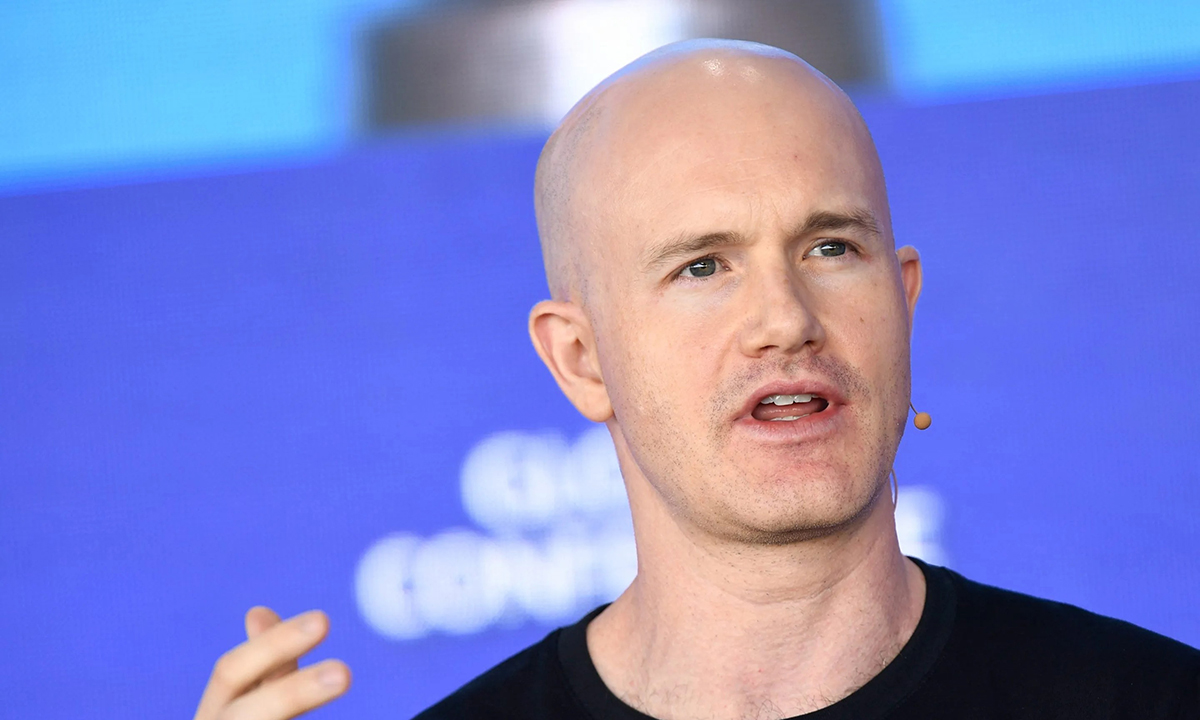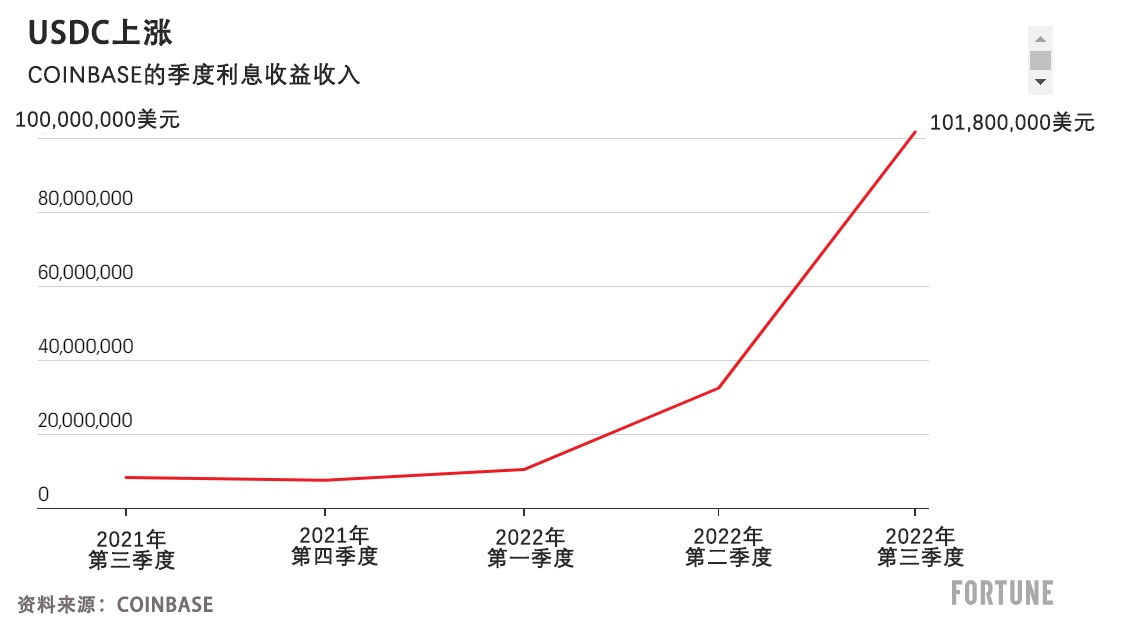
加密货币行业最成熟的公司之一,迎来了加密货币寒冬。大型加密货币交易平台Coinbase在11月3日披露,第三季度净营业收入同比减少28%,随着投资者纷纷离开高度波动的加密货币行业,零售和机构交易量受到严重冲击。
不过,位于旧金山的Coinbase在亏损当中确实有一个亮点:在美国证券交易委员会(SEC)申报文件里的“订阅与服务收入”项下的“利息收入”,第三季度增长至1.018亿美元,是第二季度3,250万美元的三倍以上,约占公司总净收入的五分之一。
利息收入增长可以归功于Coinbase持有的去中心化美元USDC。USDC是与美元挂钩的一种稳定币,Coinbase通过与Circle组成的联合体共同拥有USDC。USDC与现金储备和美国国债的兑换比例为1:1。随着美联储为抑制通胀加息,USDC为Coinbase带来了收入。

该公司将这笔收益列入“利息收入”。在11月3日下午举行的投资者电话会议上,Coinbase的首席财务官阿莱西亚·哈斯称,公司在USDC领域的合作,是其为实现产品多元化重点开展的合作项目之一。公司最近还与贝莱德(BlackRock)及谷歌(Google)等公司建立了合作。
在电话会议上,该公司的创始人及首席执行官布莱恩·阿姆斯特朗对USDC大加赞扬。他表示,当其他国家都在尝试开发央行数字货币时,USDC将成为美国事实上的央行数字货币。
阿姆斯特朗指出:“美国的政策制定者将确定必要的框架,使私人市场能够实际开发解决方案,而且与美元挂钩的加密货币一直在快速增长。”他预测,USDC将超过泰达币(Tether),成为全球最大的稳定币。泰达币是目前市值最大的稳定币。USDC排在第三位,落后于泰达币和币安(Binance)的稳定币BUSD。
阿姆斯特朗还提到了美国的监管不确定性,就如何监管去中心化金融(DeFi)的激烈讨论发表了自己的看法。今年10月初,FTX的萨姆·班克曼-弗里德呼吁行业对监管部门要更包容,随后引发了讨论。
阿姆斯特朗表示,在理想情况下,最有可能通过的加密货币立法是美国参议院正在讨论的《数字商品消费者保护法案》(Digital Commodities Consumer Protection Act)。该法案将进一步明确对集中交易平台、保管服务和稳定币的监管法规,但他并没有提到去中心化金融,尽管他承认去中心化金融已经变成了一个热点话题。
他说:“监管环境将是释放这个行业的发展潜力甚至使价格重回正轨最重要的因素之一。”(财富中文网)
译者:刘进龙
审校:汪皓
加密货币行业最成熟的公司之一,迎来了加密货币寒冬。大型加密货币交易平台Coinbase在11月3日披露,第三季度净营业收入同比减少28%,随着投资者纷纷离开高度波动的加密货币行业,零售和机构交易量受到严重冲击。
不过,位于旧金山的Coinbase在亏损当中确实有一个亮点:在美国证券交易委员会(SEC)申报文件里的“订阅与服务收入”项下的“利息收入”,第三季度增长至1.018亿美元,是第二季度3,250万美元的三倍以上,约占公司总净收入的五分之一。
利息收入增长可以归功于Coinbase持有的去中心化美元USDC。USDC是与美元挂钩的一种稳定币,Coinbase通过与Circle组成的联合体共同拥有USDC。USDC与现金储备和美国国债的兑换比例为1:1。随着美联储为抑制通胀加息,USDC为Coinbase带来了收入。
该公司将这笔收益列入“利息收入”。在11月3日下午举行的投资者电话会议上,Coinbase的首席财务官阿莱西亚·哈斯称,公司在USDC领域的合作,是其为实现产品多元化重点开展的合作项目之一。公司最近还与贝莱德(BlackRock)及谷歌(Google)等公司建立了合作。
在电话会议上,该公司的创始人及首席执行官布莱恩·阿姆斯特朗对USDC大加赞扬。他表示,当其他国家都在尝试开发央行数字货币时,USDC将成为美国事实上的央行数字货币。
阿姆斯特朗指出:“美国的政策制定者将确定必要的框架,使私人市场能够实际开发解决方案,而且与美元挂钩的加密货币一直在快速增长。”他预测,USDC将超过泰达币(Tether),成为全球最大的稳定币。泰达币是目前市值最大的稳定币。USDC排在第三位,落后于泰达币和币安(Binance)的稳定币BUSD。
阿姆斯特朗还提到了美国的监管不确定性,就如何监管去中心化金融(DeFi)的激烈讨论发表了自己的看法。今年10月初,FTX的萨姆·班克曼-弗里德呼吁行业对监管部门要更包容,随后引发了讨论。
阿姆斯特朗表示,在理想情况下,最有可能通过的加密货币立法是美国参议院正在讨论的《数字商品消费者保护法案》(Digital Commodities Consumer Protection Act)。该法案将进一步明确对集中交易平台、保管服务和稳定币的监管法规,但他并没有提到去中心化金融,尽管他承认去中心化金融已经变成了一个热点话题。
他说:“监管环境将是释放这个行业的发展潜力甚至使价格重回正轨最重要的因素之一。”(财富中文网)
译者:刘进龙
审校:汪皓
Crypto Winter has come for one of the most established companies in the industry. The giant exchange disclosed on November 3 that net revenue for the third quarter was down 28% from the previous one, and that retail and institutional trading volumes took major hits as investors move away from the volatile crypto sector.
San Francisco-based Coinbase did report a bright spot amid the losses: a category called “interest income,” filed under “Subscription and Services Revenue” in the SEC filing, rose to $101.8 million in the third quarter—a figure that is more than three times higher than the $32.5 million it posted in the second quarter, and which accounted for almost a fifth of total net revenue.
The interest income growth can be attributed to Coinbase’s holdings of USDC, a stablecoin pegged to the U.S. dollar, which Coinbase owns jointly through a consortium with Circle. USDC is backed 1 to 1 by reserves of cash and Treasury bills. As the Fed has raised interest rates with the hope of curbing inflation, Coinbase has been able to collect the revenue.
The company files the earnings under “interest income.” In an investor call November 3 afternoon, Coinbase CFO Alesia Haas described the company’s USDC tie-up as one of the partnerships it has prioritized to diversify its offerings, just as the company has recently teamed up with other companies like BlackRock and Google.
During the call, founder and CEO Brian Armstrong praised USDC, saying that as different countries pursue central bank digital currencies, USDC will become the de facto central bank digital currency in the U.S.
“The policymakers in the U.S. will set the framework that need to be followed so that the private market will actually create the solutions, and USD coin has been on a really rapid rise,” Armstrong said. He predicted that it will become the largest in the world ahead of Tether, which is currently the largest stablecoin by market cap. USDC is third, behind Tether and Binance’s stablecoin, BUSD.
Armstrong also spoke to the regulatory uncertainty in the U.S., weighing in to the broader discussion over how DeFi, or decentralized finance, should be regulated—a discussion sparked earlier in October when FTX’s Sam Bankman-Fried called for the industry to be more accommodating of regulators.
Armstrong said that in an ideal world, the most promising piece of crypto legislation—the Senate’s Digital Commodities Consumer Protection Act—would be passed to add clarity to regulation around centralized exchanges, custodial services, and stablecoins, without addressing DeFi, although he acknowledged that it is becoming a hot button issue.
“The regulatory environment is one of the biggest unlocks we’re going to have in terms of growing this industry and perhaps even getting the prices to go back up in the right direction,” he said.






